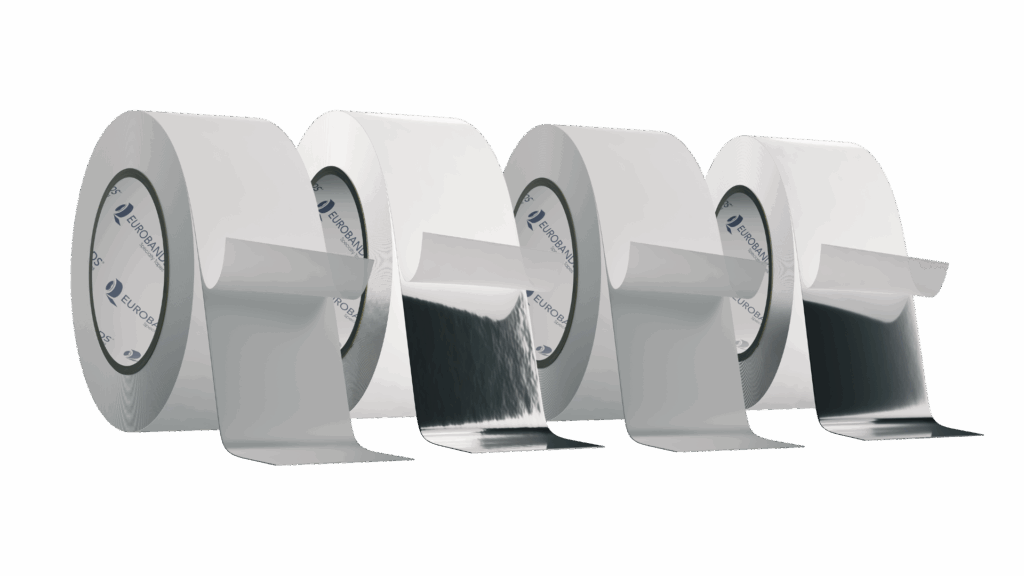In industries like construction, roofing, HVAC, automotive, marine, and renewable energy, reliable sealing is critical to ensuring the longevity and performance of structures and equipment.
Butyl adhesive tapes offer a powerful sealing solution, combining strong adhesion with excellent resistance to moisture, chemicals, and extreme temperatures.
In this article, we cover the top five benefits of using butyl tape — and explain how tailored converting can maximize efficiency for specific applications.
1. Butyl tape for exceptional waterproofing and airtight sealing
Butyl tapes are highly effective at creating airtight and watertight seals. Thanks to the butyl rubber base, they can maintain a secure bond even when exposed to water, vapor, and high humidity.
Applications:
Sealing roofing membranes and flashing details.
Waterproofing joints in prefabricated concrete structures.
Preventing air and moisture leakage in HVAC ducts.
2. High adhesion to a variety of substrates with butyl tape
Butyl tapes adhere strongly to a wide range of surfaces, including:
Metals (aluminium, steel)
Plastics
Glass
Wood
Concrete
They perform well even on rough, uneven, or porous surfaces without the need for primers in most cases.
Applications:
Bonding window and door frames in construction projects.
Sealing overlaps on metal roofing sheets.
Mounting solar panels on different substrates.
3. Butyl tape for long-term durability and flexibility
Unlike many other sealants, butyl remains flexible over time without hardening or cracking.
It absorbs movement from expansion, contraction, and vibration, ensuring the seal remains intact even under mechanical stress.
Applications:
Expansion joints in facades and cladding systems.
Sealing cable penetrations in data centers and energy storage units.
Flexible sealing in marine vessels subject to constant vibration.
4. An excellent resistance to weathering, UV and chemicals
Top-grade butyl tapes resist:
UV exposure
Oxidation
Chemicals (including mild acids and alkalis)
Temperature fluctuations (cold and heat)
This makes them ideal for outdoor and industrial applications where environmental conditions can be harsh.
Applications:
Weatherproofing roof structures and ventilation outlets.
Sealing joints in greenhouse constructions.
Protecting cable junctions in offshore wind farms.
5. Butyl with for easy and clean application
Butyl tapes are easy to handle and apply:
No curing or drying time is required.
They can be repositioned during application without losing adhesion.
They leave no mess compared to liquid sealants.
This translates into faster and cleaner installations — especially important on large job sites or in production lines.
Applications:
Sealing prefab building modules during assembly.
Fast repairs on metal panels, gutters, and roof structures.
Installation of HVAC components without liquid adhesives.
Tailored formats : why is it so important to convert butyl tape
While standard butyl tape rolls suit many tasks, custom formats help optimize installation speed, material use, and system performance.
We offer converting services such as:
Custom widths and thicknesses for specific sealing applications.
Die-cut butyl patches for quick, consistent installation.
Pre-cut rolls or strips for modular and prefab construction.
Why customize?
Reduce waste: Pre-sized tapes eliminate unnecessary trimming.
Increase speed: Pre-cut patches or strips speed up repetitive tasks.
Improve seal quality: Consistent shapes and sizes reduce sealing errors.
Industries benefiting from converting:
Construction companies sealing roof and facade panels with custom die-cut butyl seals.
HVAC contractors using narrow strips for fast duct sealing.
Solar and energy sectors installing mounting systems with pre-formed butyl gaskets.
Butyl tapes offer an outstanding combination of waterproofing, adhesion, durability, and ease of use — making them an essential solution for sealing and protecting a wide variety of structures and systems.
By choosing converted formats, companies can further improve their installation speed, quality, and cost-efficiency.



